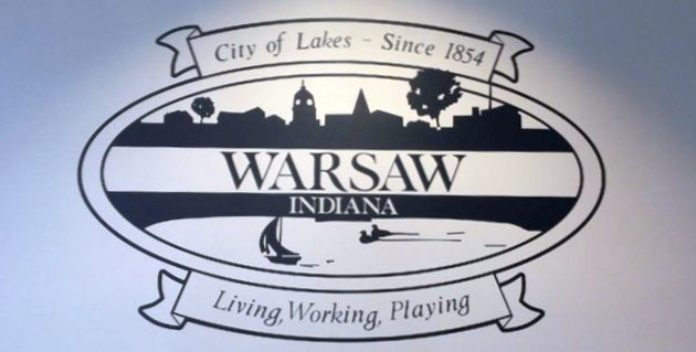Sewer fees will increase in Warsaw, but not as much as anticipated for the first phase of the city’s sewer project.
The revenue lost from the reduced increase – about $385,000 annually – will have to be made up in the second phase.
By unanimous vote Monday night, the City Council – citing a desire to be “fair and equitable” – approved an amendment to the new sewer rate ordinance eliminating the $3.79 billing component for all residential and commercial properties. That leaves the flow rate ($5.65 per 1,000 gallons) and the collection system charge of $8.21 in a monthly bill, both 20 percent increases over the current rate.
Based on 4,800 gallons, that will make a monthly bill $35.33 instead of $39.12 proposed in the ordinance before the amendment.
The current rate is $32.60.
The proposed changes were also approved on second and final reading.
At the Oct. 16 city council meeting, by a vote of 4-3, the board defeated the original proposed ordinance. On Oct. 27, the council reached a consensus to move forward with a new proposal for the Nov. 6 meeting, where it was approved on first reading. An ordinance must be approved on two separate readings.
The only difference between the Oct. 27 proposal and the original was the charge for maintaining the billing department. The billing component in the Oct. 27 ordinance would have reduced the number of bills a multi-family unit receives.
In a four-unit multi-family, where only one bill is provided for all four units, there would have been only one billing fee of $3.79 instead of four. With Monday night’s amendment, no billing department component will be assessed.
The city has proposed a $41 million sewer project, including $10.1 million in improvements to sewer lines and manholes in phase I. Bids for phase 1 came in about $3 million less than estimated.
Phase II will involve a $30 million expansion of the city’s wastewater treatment plant, which is mandated by the state, and will be funded with another sewer rate hike that will be proposed next year.
In introducing the amendment, Mayor Joe Thallemer explained, “A few of the council came to me and asked about potentially eliminating the billing department fixed component, the $3.79, for all users. That would maintain equity and balance, resulting in … an across-the-board increase. Now, that would result in a lower increase this year. Our idea was to try and keep the increases as even as possible so they were equally stair-stepped in. But because of where we’re at now, this proposal would reduce rates and we wouldn’t be looking at the 20 percent increase. … And the bottom line is it’s going to have to be made up next year. What we don’t charge this year, we’re going to have to make it up next year.”
Jeffrey P. Rowe, H.J. Umbaugh & Associates partner, said, “In terms of us looking at the financial impact of the loss of revenue by eliminating the billing charge, we did look at that. Based on that estimated loss of revenue, it does appear the city could still afford the $10.1 million project. Certainly, you wouldn’t have the margin you had before without that revenue, but the revenues would be sufficient to be able to close with (State Revolving Fund) and still maintain the minimum bond coverage loan.”
During public comments, Chris Volkers, a landlord, asked how much revenue the city would be giving up by dropping the billing charge. Rowe said the reduction in revenue is estimated to be around $385,000 per year.
On the amendment, Mike Klondaris, council president, said, “I think you all know how I feel about this. I voiced about keeping this fair and equitable across the board. I could support this.”
City Councilwoman Diane Quance, who opposed the original ordinance, said she’s been asked by several people why she voted the way she did.
“To me it’s always been a matter of semantics. I’ve been concerned that we’re stating, in the original ordinance, that we were charging a billing fee but it was not connected to a bill, and that is a problem. It could be challenged at some point. I think we need to look at what the billing department collection system actually consists of, because I think it consists of more than sending a bill, but right now we don’t have all that documented and we don’t have all the fees involved in that documented,” she said. Quance made the motion to approve the amendment.
Councilman Jerry Frush said, “The biggest thing is that everyone should be treated equally. Everybody. I felt like the way we did have it (in the original ordinance), everybody was being treated equally.”
Councilman Jeff Grose said when it comes to being fair and equitable, the council had to be careful. “We are making a major overhaul, which I firmly believe is the right thing to go with flow, but we probably only have half of our users billed on flow. The rest are on well, or they are in dwelling units where you can not measure how much water is coming in and out of that unit. So we have to be very cautious. … My struggle has been also, fair and equitable.”
Councilman Jack Wilhite said, “Many times I’ve stated that (it be) fair and equitable. That’s the main thing I want to see done. I want to see everybody paying their fair share. I believe that neither one of these last two are totally that way because we do have things to work through yet. But, that doesn’t mean we shouldn’t be making progress.”
The city council also approved on second reading the sewage works bond ordinance as amended Monday. With the bids coming in at just over $6.7 million, the amendment allows the remaining portion of the $10 million to be used for alternate sewer work.
City Engineer James Emans explained, “When we put the package together, we had identified almost $13 million worth of imminent pipe failure, pipe work that needed to be done. But due to the limitations of bonding only $10 million, we had to pare out some of that work. With bids coming in so favorable, we can do all that work that was identified within that $10 million bond.”
Utility Manager Brian Davison said, “We really did receive very favorable pricing per foot on the lining projects under engineer estimates. And so, we’re able to do this work now. Even if we cut it out and do it later – which it has to be done – we’re probably going to pay a higher rate later than if we do it now.”
Councilman Ron Shoemaker asked how much the additional work would cost if they didn’t do it now. Emans estimated the work would increase 3 to 5 percent every year it was put off.
Before making the motion to approve the amended sewage works revenue bonds, Shoemaker said, “At first when bids came in $3 million less, I was kind of excited that was $3 million we didn’t have to add in debt … But listening to the economic scale and severity of some of this stuff, I think it’s probably smart.”





